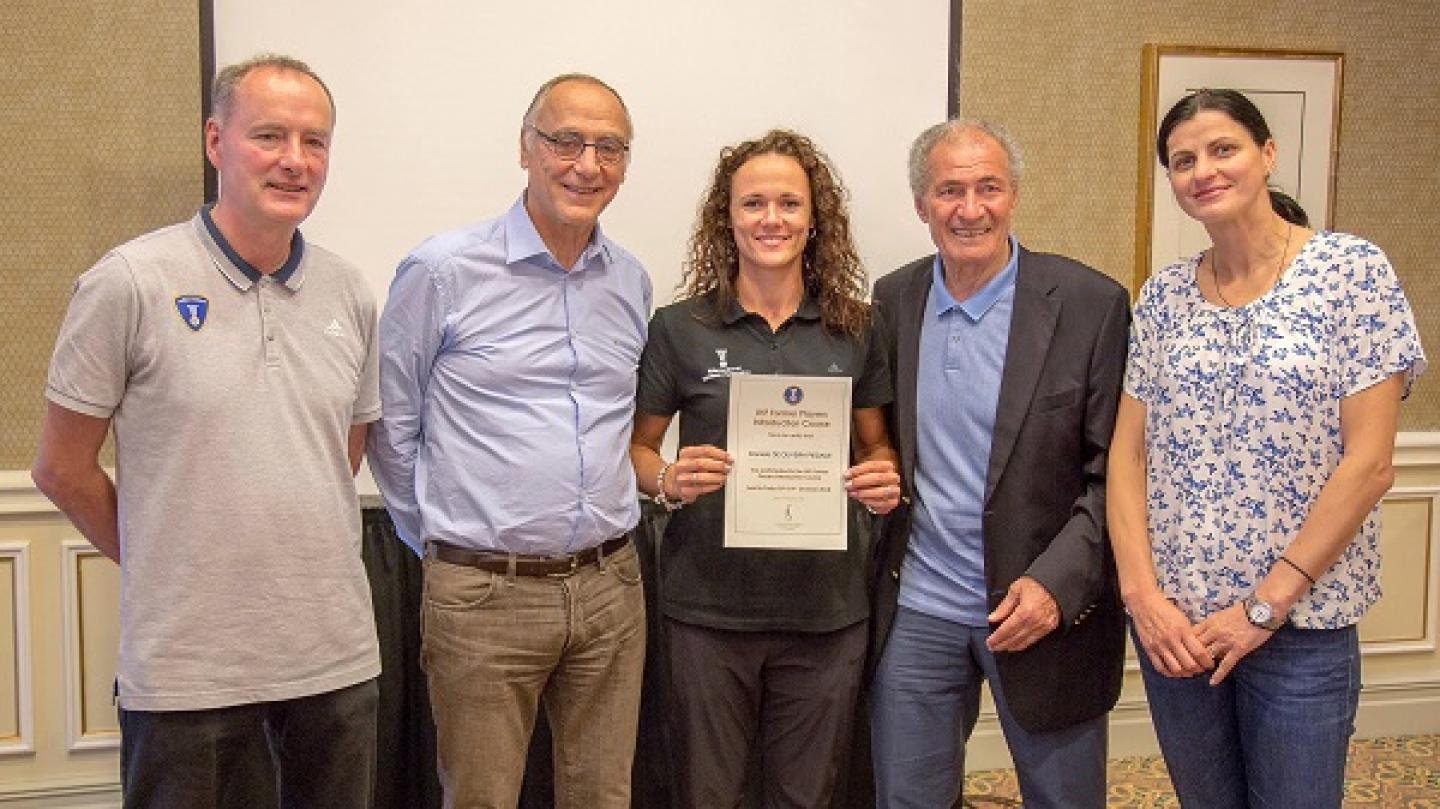Moustafa: “You are going to help us, and we want to help you”
19 Oct. 2018

The 2018 IHF Former Players’ Course was held on the fringe of the 2018 IHF Super Globe in Doha, Qatar with 11 previously professional and international players from two continents participating. Following the first Former Players’ Course in 2017, which focused only on tasks as a technical delegate, the 2018 course covered a range of topics including refereeing, analysis, technical delegates and media.
The participants in the 2018 edition were Romanian Angela Picu, Aurica Motogna, Tatiana Cojocaru and Ionela Stanca; Brazilian Daniela Piedade and Lucila Dos Santos; Russian Ekaterina Andryushina; Slovenian Nataliya Derespasko; German Christina Lindemann; Austrian Eugenia Rotis-Nagy; and Egyptian Assem Elsaadany.
“There was much, much more information – there was general, there was a coach, referees, delegates, media. There was a lot of information, and I like it, really, because we didn’t know a lot of the different things behind us. Now I heard, I was really surprised, because it is very important what everyone does,” said former Brazil international and 2013 world champion Daniela Piedade, who attended the course in Doha last year also. “Sometimes I was like: What? Is it really like that? I was really surprised. It was really different.”
The course began the day prior to Super Globe throw-off, on October 15, and ran through to the final day of competition on October 19. The opening day included a general introduction to the IHF with lectures on the structure, organisation and activities of the IHF. Next, IHF event delegate Marek Goralczyk presented a talk on the tasks and profiles of event delegates. In the afternoon, Goralczyk ran through the event delegate tasks using the working example of the Super Globe.
The focus on day two of the course was the referee perspective, with IHF Playing Rules and Referees Commission Chairman Ramon Gallego leading discussion on the modern requirements of referees, rule interpretation and guidelines, and planning a career as a referee. The group also completed analysis of referee performance for one Super Globe match.
Day three concentrated on the coach perspective, with Commission of Coaching and Methods Chairman Dietrich Späte and CCM Member and Brazil women’s coach Jorge Duenas speaking on the modern requirements of coaches, development trends in women’s handball, and match analysis. In the afternoon and evening, the group participated in match analysis of the first round of Super Globe placement games and the semi-finals.
The coach perspective topic continued over day four of the course, with further match analysis and selection of highlights clips for IHFtv. The final topic related to coaching focused on developing a career in this profession.
On the final day of the course, IHF Executive Committee Member and Chairwoman of the IHF Women’s Handball Working Group Narcisa Lecusanu presented the results of a survey conducted by the Women’s Handball Working Group. The survey was sent to Federations around the world with the goal of learning the different needs by continent and country. The participants discussed the situation in women’s handball at length, and the group are highly motivated to develop women’s handball to reach a similar level of global recognition to that of men’s.
“There is a big difference. I have discussed before with some people in the IHF, and they have shown me it is a big difference – in the hall, in the organisation. For example, the women’s halls are smaller and we don’t have some places for the public and there is a lot difference. We hope it can be more near,” said Piedade.
“I know it cannot be the same – maybe in the future – but step by step. Of course, now we talked a lot about women’s handball because we need more support. Not just in the IHF or the Brazil Confederation – all Federations need more support.
“In Brazil, the women are more famous because we had more results. But the Confederation see us as the same – girls and men’s. It’s OK, but we have results, and we have to give more support. Around the world, you need support, because the level is completely different.”
The final lecture was presented by IHF media group member Courtney Gahan, in which the participants learned about the structure and tasks of the IHF media group, as well as general information on media in handball including work at championships and between events, the role of the player and options for former players to work in media.
The course was closed by IHF President Dr Hassan Moustafa and IHF Vice-President Joel Delplanque, who invited participants to share their concerns and ideas, and gave their own input on the topic of developing women’s handball. The course participants expressed their determination to contribute to the development of women’s handball through their own national federations as well as globally, and highlighted difficulties breaking into roles in their federations.
Dr Moustafa thanked the participants and spoke about the IHF’s desire to have an increasing number of women in key roles in handball. He also expressed a wish to assist former players with finding the right path to remain involved in the sport after their retirement from the court.
“If you are a player you feel some small things that others don’t,” concluded Dr Moustafa. “We want to help each other. You are going to help us, and we want to help you.”

